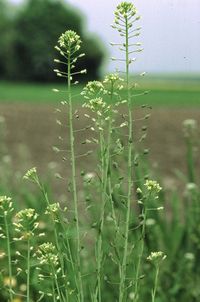
Photo from wikipedia
A Pichia pastoris recombinant cold-adaptive lipase (rePcLip) from Penicillium cyclopium was successfully immobilized on modified palygorskite to develop a robust biocatalytic system for biodiesel production from soybean oil. The optimum… Click to show full abstract
A Pichia pastoris recombinant cold-adaptive lipase (rePcLip) from Penicillium cyclopium was successfully immobilized on modified palygorskite to develop a robust biocatalytic system for biodiesel production from soybean oil. The optimum immobilization conditions were addition amount of 6 g rePcLip to 10 g modified palygorskite, pH 7.0, and binding time 5.0 h. Under these optimal conditions, it reached a transesterification activity of 445.2 U/g (palygorskite with well-immobilized rePcLip, PLG-rePcLip). For biodiesel preparation, the optimized reaction conditions were 20 g soybean oil dissolved in 12 mL t-butanol solvent, 3.7 mL methanol (molar ratio of methanol to oil was 4:1), 0.6 mL water, and 1.6 g PLG-rePcLip at 25 °C and a shaking speed of 200 rpm. The methanol was supplemented at a frequency of 4 times in 48 h (at 0, 7, 16, and 29 h) by adding quarters of methanol that kept 4:1 molar ratio of total methanol to oil. After a 48-h reaction, the transesterification ratio was 93.2%. After reusing immobilized rePcLip for 8 cycles, the residual activity and biodiesel yield were 71% and 65%, respectively. As a non-commercial cold-adaptive biocatalyst, rePcLip immobilized on palygorskite should be a promising alternative for biodiesel production.
Journal Title: Biomass Conversion and Biorefinery
Year Published: 2021
Link to full text (if available)
Share on Social Media: Sign Up to like & get
recommendations!